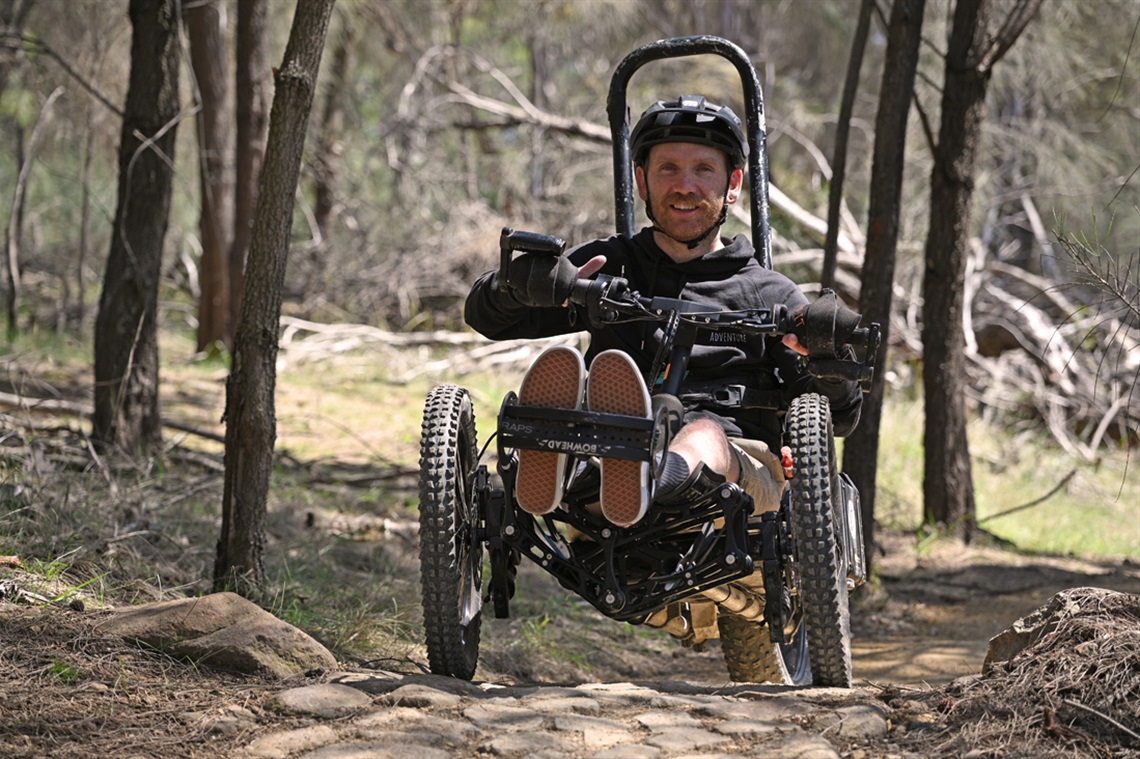
Gordon Broome, a carpenter by trade, loved spending his days exploring Tasmania's wild outdoors with his partner Chloe and their kelpie, Alba. From mountain biking to hiking and climbing, adventure was second nature.
Then, in 2021 while mountain biking with friends on his property, a fall changed everything.
"I went over the handlebars and broke my neck at the C5/6 area," says Gordon, Gordy to his mates.
Emergency surgery in Hobart was just the beginning. He was flown to Melbourne three days later and then to Sydney, where he spent four and a half months in hospital before continuing rehabilitation at Royal Rehab for another three and a half months.
“It was a long road, but I always kept my sights on getting back out there — just in a different way,” says Gordy.
Chloe played a pivotal role in the recovery process, using social media to explore adaptive technologies and to connect with other wheelchair users.
"We quickly realised I needed an adapted mountain bike to access the wild places I love," says Gordy.

Gordy at the start of the Queens Domain summit loop.
Adapted for adventure
Adapted mountain bikes open up the sport to people with disabilities or mobility challenges. Their design varies greatly but can include features like three wheels for stability, hand-powered mechanisms and electric assist for difficult terrain.
They are a game changer for many riders, allowing them to navigate trails that may otherwise be inaccessible and offering the opportunity to people of all abilities to experience the physical and mental benefits of outdoor recreation.
"It’s incredible technology, but it’s not cheap,” says Gordy. “That’s where the community came in."
Push Mobility helped source Gordy’s new Bowhead bike from Canada, and funding from the National Disability Insurance Scheme made the purchase possible.
"There’s no way I could do what I do now without the help of my family, friends and the broader community," says Gordy.
Epic by nature
Gordy is on the Queens Domain putting a newly modified mountain bike track at the summit through its paces.
He worked closely with the City of Hobart to make the track accessible to a wider range of riders by widening the track and improving corners, creating a ride that is now good for intermediate adaptive mountain biking.
These relatively small changes not only improved accessibility for people with disabilities but also set a precedent for future track developments.

Empowering others
His passion for connection and the outdoors inspired Gordy and his best friend, Max Oulhen, to launch Tasmanian Adventure Support, a business aimed at helping people with disabilities experience adventure.
"We offer everything from adapted mountain biking to surfing, providing equipment and physical support," he says. “It’s about showing people what’s possible and encouraging more people to do epic stuff.”
Despite the challenges, Gordy remains driven by his love for the outdoors and his mission to make it accessible for all.
“Life looks a bit different now, but the goal is still the same - exploring the wild and helping others do the same.”
The intermediate grade adapted mountain bike friendly track on the Queens Domain Summit is a great beginners track and popular with trail runners.
It loops around the Domain summit, ducking and weaving its way through forest and across native grass fields with views of the mountain and River Derwent.
We encourage everyone to check it out.
For more information about adaptive mountain bikes, visit the Disability Sports Australia website.